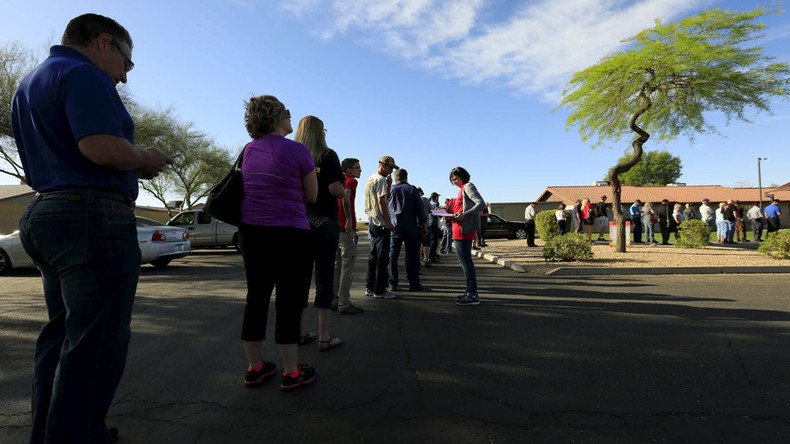Dem. Party, Clinton and Sanders to sue Arizona over voting delays in March primaries – report

The Democratic Party and its presidential contenders Hillary Clinton and Bernie Sanders are reportedly going to sue Arizona over its “history” of voting rights problems, which have led to hours-long waits and mishandled ballots in recent primaries.
The lawsuit will be filed on Friday and will call on the US District Court of Phoenix to review the state's polling plan ahead of the presidential election on November 8, The Washington Post reported.
“Arizona has a history of problems with guaranteeing the rights of their citizens to vote, and with this lawsuit we hope to stop it now in time for the 2016 general election,” the elections lawyer for Clinton’s presidential campaign Marc E. Elias said, according to the Post.
Initiated by Elias, the lawsuit is focusing on Arizona’s Maricopa County. Last month, it became the scene of exhausting lines when hundreds of voters were forced to stand for hours in order to cast their ballots in the Democratic and Republican March 22 primaries. Many left without having voted.
Some of those who waited until the end still failed to make their vote count as many voters were given provisional ballots. It was later discovered that those ballots were not counted toward the election.
Under fire for what people labeled “Arizona election fraud,” Phoenix Mayor Greg Stanton said the misconduct was a result of Maricopa County authorities cutting polling places by 85 percent compared with the 2008 primary, and by 70 percent compared with the primary in 2012.
#ArizonaElectionFraud: Secretary of State baffled by vote count fiasco (VIDEO) https://t.co/Cl2OXHVIaipic.twitter.com/152QRq69AW
— RT America (@RT_America) March 30, 2016
The Washington Post has quoted the lawsuit as saying that Arizona’s “alarmingly inadequate number of voting centers resulted in severe, inexcusable burdens on voters county-wide, as well as the ultimate disenfranchisement of untold numbers of voters who were unable or unwilling to wait in intolerably long lines.”
The suit alleges that “the burden” weighed heaviest upon Maricopa County’s black, Hispanic and Native American communities, where fewer polling locations were available compared to predominantly white communities or in some cases precincts with no voting places at all.
The lawsuit is also challenging a rule that stipulates that ballots cast in a precinct other than the one to which the voter is assigned cannot be counted.
This is going to be Elias’s fifth such case after suing Ohio, Virginia, Wisconsin and North Carolina. This time Elias is filing the lawsuit on behalf of the Democratic National Committee, the Democratic Senatorial Campaign Committee, the Arizona Democratic Party and several Arizonans.
According to the newspaper, both Clinton’s and Bernie Sanders’s campaigns are going to join the suit. Democratic officials reportedly said that Clinton will take part after the lawsuit is actually filed.
Justice Dept. launches investigation into #arizonaprimaryhttps://t.co/mdkhnTJ3Uxpic.twitter.com/fsPSE7v4aU
— RT Play (@rt_play) April 6, 2016
Back in March, Sanders, who received almost 40 percent of the vote in Arizona, called the voting delays “a national disgrace.”
Elias believes that Arizona’s voter disenfranchisement is a symptom of a broader effort by Republicans to derail the democratic process.
“Increasingly, what we’ve seen over the last few years has been a wide-scale effort by Republicans in state after state to make voting harder,” he said.
Following the March 22 primaries, Maricopa County Recorder Helen Purcell, a Republican herself, took the blame and apologized for the flaws.
“We made some horrendous mistakes,” she said. Purcell explained that her decision to cut back on the number of voting stations was based on 2008 experience, when many mailed their ballots, as well as her intent to save money.
Fury at GOP after Cruz handed ‘voterless victory’ in Colorado https://t.co/7uybRHSJLTpic.twitter.com/5pWAl1t5dZ
— RT America (@RT_America) April 11, 2016
On April 5, the Justice Department's Civil Rights Division notified Purcell’s Office that it was investigating Arizona primary, to determine whether the state's largest county complied with voting rights laws.












